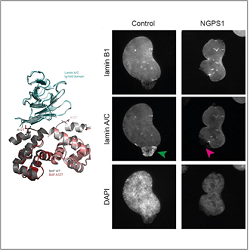
Nestor–Guillermo progeria syndrome (NGPS) is one of several ultra-rare genetic conditions caused by mutations in genes associated with nuclear envelope function. Dr Delphine Larrieu’s group researches how such mutations affect the structure and function of the nuclear envelope and from this, how potential treatment strategies could be developed for these devastating conditions. The group’s most recent paper uses NGPS patient-derived fibroblasts, crystallography and in vitro assays to study the impact of the causal mutation in the BAF gene. Publishing in Nucleic Acids Research, Dr Anne Janssen and colleagues demonstrate that the pathological BAF mutation reduces the interaction between BAF and the nuclear envelope protein lamin A/C, preventing the recruitment of lamin A/C to sites where the nuclear envelope has ruptured. As a consequence, the paper shows that the integrity of the nuclear envelope in NGPS cells is affected, not because of an inability to repair these ruptures, but because of an increased amount of weak spots in the nuclear envelope – resulting in frequent re-rupturing over time.
The proposed disease-associated mechanism could be of direct relevance to the skeletal fragility observed in NGPS patients.

